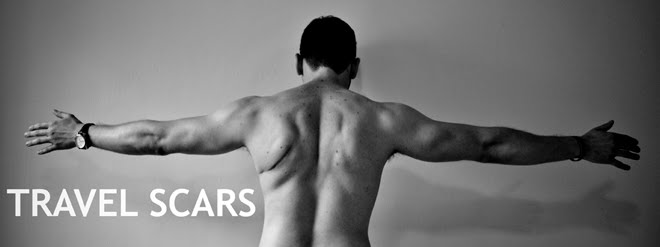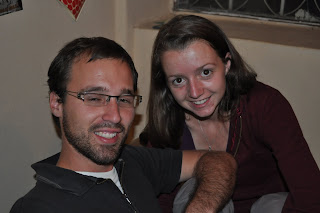Nov 15th - 19th
The most ironic part of our walk to the desert highway was that we had seen a convoy of passenger buses crossing our path as we approached, however, when we finally reached the roadside, we no longer saw any and were left to flag down any other type of vehicle (i.e. pickup trucks, flatbed trucks and passenger vehicles). After around an hour in the scorching, unrelenting heat; a small hatchback pulled over and offered us a ride. We said we were heading to Atbara and the driver seemed to know the destination. There were already 3 other men in the car, but we still managed to sit quite comfortably in the small hatchback.
Around an hour later, the two other passengers took out their luggage and were dropped off at the side of the road. After another 45 minutes, we were nearing Atbara. Chris and I had decided that we would tip this kind man and as he let us off in Atbara, we offered him the Sudanese pounds which we deemed an appropriate tip. As he took the money, he counted it and asked us for more. It had turned out he was only giving rides to people who payed him, so we coughed-up what he had asked for and left the car.
The subsequent walk around Atbara left little to the imagination: the streets were absolutely littered with garbage and everyone in the city appeared to be quite surprised by our presence. Our futile attempts at finding a lokanda on our own culminated in us dejectedly hailing a rickshaw which brought us to the Nil Hotel.
The Nil hotel was more expensive than we had hoped, although it was well kept, had a television with English channels and a ventilation system that kept the room quite cool despite the staggering temperatures outside. We were only planning on staying one night, but our ensuing discussion with a bus station attendant revealed that we would be forced to stay an extra night because there were literally no buses heading for Karima the following day due to Eid. We therefore used the opportunity to relax, sleep-in and plan the rest of our stay in Sudan.
The following day we wandered the deserted streets in search of food, which actually turned out to much more difficult than we had thought, due to literally everyone enjoying plentiful feasts with their relatives and loved-ones. We did manage to find one restaurant which offered some tasty Arabic fare and spent the rest of our time chilling at our hotel.
When the buses did resume, we were sure to catch the first one leaving towards Karima. Upon our arrival, We asked the driver to drop us off at the Lonely Planet recommended lokanda, however, after knocking on the locked steel doors, we quickly realized that it too, was also closed due to Eid. A short walk led us to the main street where we saw a restaurant emblazoned with Sudanese flags. We entered and a man directed us to another lokanda, but stated that if it was closed, we could come back to the restaurant.
We found the other lokanda but they would not let us check-in until we registered at the nearest alien affairs office. These offices exist in every city, and all foreigners are required to check-in and leave important information with the officers stationed there. It is their way of keeping tabs on all foreigners within their borders.
After having checked-in, Chris and I decided that we didn't really want to stay at the sole lokanda available to us, instead we went back to the restaurant to see what the man could offer. As soon as we entered, he immediately sat us down and gave us some ful (beans in oil and tahini), roast lamb, and bread. He sat with us and we told him we had come from Khartoum and would be heading north to Wadi Halfa, to take the ferry to Egypt.
As soon as he heard we would be heading to Egypt, his excitement could not be contained. This man's name was Rami and he was originally from Cairo. For reasons still unbeknownst to me, he is working in Karima of all places, away from his wife and two young sons, who are still in Egypt. Rami's vocabulary in English probably totaled 10 words or so, still doubling our linguistic knowledge of Arabic. Nonetheless, within hours of signing, drawing and miming what we were trying to express, we actually seemed to understand each other.

The Sudanese are world-renowned for their hospitality and generosity: it is not uncommon for someone to pay for your bus fare, buy you a cup of shai or offer you some food from their plate; and these are complete strangers! Although Rami was Egyptian, I have never known anyone more generous than this sweet man. Although I know he was not well-off, he would vehemently refuse every offer Chris and I would make to give him money or pay for pretty much anything. When we were in the restaurant, every beverage and food item was at our disposal. The only thing Rami asked for was to pay for bottled water. I'm assuming because it probably wasn't very easy to come by. He even let us sleep on two cots in the back of the restaurant, while he would sleep on a mattress draped over one of the restaurant's tables.
I know Chris and I are incredibly respectful and really make an effort to conform to the practices and cultures of a country, but to be honest, I still don't know why Rami treated us so kindly and never expected anything in return. I have a suspicion that Rami saw Chris and I as older versions of his sons, who he misses so much. His fatherly selflessness and sacrifice were absolutely humbling. I hope that within the time of writing this entry, that Rami will have had the opportunity to return to Egypt and be reunited with his wife and children.
For the three nights and four days we were there, I really enjoyed my time in Karima: Rami was an absolutely splendid host; the population of Karima really took a shine to us, going as far as waving and calling us by name as we walked by in the streets; and the nearby ancient of ruins of Jebel Barkal were utterly stunning.

Jebel Barkal is a very small mountain located just outside Karima. The historical city of Napata lies just at it's base. Napata was the first capital of the Kingdom of Kush and where the Nubians regained autonomy from the Egyptians. It is the site of the temple of Amun, whose many pillars have been reduced to just two.



It is also the site of several Nubian burial pyramids, which are in various states of dilapidation.


Chris and I visited this ancient site on several occasions and even climbed Jebel Barkal with the locals and some tourists, in order to admire the beautiful views of the Nile and the surrounding lush oasis.


Despite my interest and enthusiasm for Sudan, Chris was slowly coming to loathe our stay in this desert country-- with good reason mind you. One evening, as we were sleeping, I was awoken by incessant buzzing in my ears and annoying bites on my arms. Being a light sleeper, I got up, put on some bug-spray and covered myself completely with my Maasai Shuka. Chris, being a much deeper sleeper, failed to wake up and in the morning felt the wrath of those tiny, stinging insects. He literally had several hundred bites on his arms and another 30-50 on his face. The sheer number of bites led to an allergic reaction and he succumbed to a pretty serious fever. Combine this with the unrelenting temperatures outside and you have all the ingredients for absolute fury.

I on the other-hand, had a much better time than my feverish friend. I was thoroughly enjoying my stay in Sudan and Karima in particular. It's cast of characters made any scorching day that much more bearable. From the owner of Rami's restaurant, who could not pronounce Chris or James, so just decided to call us Omar and Shakur respectively; to Girgis, the desperate barber who wouldn't stop asking me to bring him back to Canada with me, simultaneously plucking out my cheek and eyebrow hairs with two cotton strings, while seemingly giving fellatio to the air. Also, the simple task of trimming my beard resulted in the desecration of my month-and-a-half facial hair experiment, leaving me looking like a gay biker. Oh Girgis, I will never forget you! Even Rami, whose continual bashing of everything having to do with Sudan and absolute reverence for everything having to do with Egypt, was also quite comical: I can't count the number of times he referred to the Sudanese as animals.

On our final morning in Karima, Rami had helped us arrange a pick-up to continue north to the city of Dongola. As the sun rose in the sky and the air was still cool from it's nightly absence, I knew we were breaking Rami's heart. He was again losing two sons, and we were losing our Egyptian father.

Before we left for the bus station, Rami gave us a paper with his phone number on it and his father's number, who still lives in Cairo. He said that if we ever needed any help once we got to Egypt, monetary or otherwise, that we would be taken care of.

We thanked him as much as humanly possible, embraced, and left him behind. I think it is no coincidence that the meaning of his name is "loving". He showed us the personification of kindness and hospitality; and we will never forget him. Shukran baba. Shukran.



















































